
Editor’s Note: Law Week Colorado edits court opinion summaries for style and, when necessary, length.
Amina Bouarfa, a U.S. citizen, began the process of obtaining permanent legal residence for her noncitizen spouse Ala’a Hamayel by filing a visa petition with the U.S. Citizenship and Immigration Services.
USCIS can approve a visa petition if it “determines that the facts stated in the petition are true” and that the noncitizen is the petitioner’s spouse. But if the noncitizen has previously sought or received an immigration benefit “by reason of a marriage determined by the Attorney General to have been entered into for the purpose of evading the immigration laws” — known as the sham-marriage bar — the agency must deny the petition.
USCIS initially approved Bouarfa’s visa petition.
Two years later, the agency sent Bouarfa a notice of intent to revoke its approval based on evidence suggesting that Hamayel had previously entered into a marriage to evade immigration laws. Although Bouarfa vigorously denied the evidence, the agency revoked its prior approval based on the Secretary of Homeland Security’s statutory authority to “revoke the approval of any petition” “for good and sufficient cause.” The Board of Immigration Appeals affirmed the revocation, finding that USCIS’s determination that Hamayel had entered into a prior sham marriage that would have prevented initial approval of the petition constituted “good and sufficient cause” for revocation.
Bouarfa challenged the agency’s revocation in federal court. The district court dismissed the suit, holding that a provision that strips federal courts of jurisdiction to review certain discretionary agency decisions barred judicial review of the agency’s revocation. The 11th Circuit Court of Appeals affirmed.
In a unanimous decision written by Justice Ketanji Brown Jackson, the U.S. Supreme Court held that revocation of an approved visa petition based on a sham-marriage determination by the secretary is the kind of discretionary decision that falls within the purview of Section 1252(a)(2)(B)(ii), which strips federal courts of jurisdiction to review certain actions in the discretion of the agency.
In its opinion, the court noted Section 1155 is a quintessential grant of discretion. The secretary may revoke a previously approved visa petition at any time for what the secretary deems “good and sufficient cause.” Such a broad grant of authority “fairly exudes deference” to the secretary and is similar to other statutes held to commit a decision to agency discretion.
Jackson wrote in the opinion that Congress didn’t impose specific criteria or conditions limiting this authority, nor did it prescribe how or when the secretary must act. The court explained context reinforces the discretionary nature of Section 1155. Section 1252(a)(2)(B)(ii)’s neighboring provision, Section 1252(a)(2)(B)(i), bars judicial review under specific provisions, each of which contains language indicating that the decisions involved are entrusted to the discretion of the Attorney General.
Bouarfa argued that although some revocations are discretionary, the revocation here was not, so Section 1252(a)(2)(B)(ii) doesn’t apply to preclude judicial review. Bouarfa contended that once the secretary approves a petition and later determines that the beneficiary had previously entered into a sham marriage, the secretary has no choice but to revoke the agency’s approval. But the Supreme Court found neither the statutory text nor its context limits the secretary’s discretion in this way.
Contrary to Bouarfa’s argument, the court noted Section 1154(c)’s text nowhere creates an ongoing duty for the agency to continually confirm that its initial approval was sound. Instead, the high court found Section 1154(c)’s command to the agency extends only to the point of approval. Turning to Section 1154(c)’s context, Bouarfa argued that because a noncitizen may use an approved visa petition to continue along the path toward permanent residency, Congress implicitly required the agency to continually reassess its prior approval. But the Supreme Court explained that nothing in the statutory scheme requires revisiting past decisions of approval.
Rather, each stage of the process comes with its own criteria. The court noted the specific grant of discretion in Section 1155 to revoke prior approval of a visa petition forecloses the argument that Congress silently mandated revocation in certain situations.
Bouarfa’s assertion that the secretary always revokes the agency’s approval of a visa petition if the agency later makes a sham-marriage determination also made no difference, according to the U.S. Supreme Court, because Congress didn’t make the availability of judicial review dependent on agency practice.
The high court ruled Section 1252(a)(2)(B)(ii) bars judicial review of decisions “made discretionary by legislation.” The court said it’s not unreasonable to suggest that Congress created a system in which a sham-marriage determination is subject to judicial review when an agency denies a visa petition but not when the agency revokes a prior approval. The Supreme Court noted that distinction “reflects Congress’ choice to provide reduced procedural protection for discretionary relief.”
Precedent also doesn’t mandate Bouarfa’s interpretation, the high court found. Unlike the discretionary determination at issue in Patel v. Garland, Section 1155’s revocation authorization has no “threshold requirements” to access the relevant discretion, so Patel doesn’t help Bouarfa.
Finally, the high court noted that because the presumption that administrative action is subject to judicial review may be overcome by clear and convincing evidence of congressional intent to preclude judicial review, there is no need to resort to the presumption of reviewability where, as here, the statute is clear.
The U.S. Supreme Court affirmed the decision.

